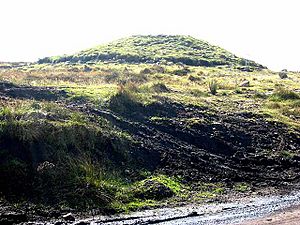Clermont Cairn facts for kids
Quick facts for kids Clermont Cairn |
|
|---|---|
| Native name Irish: Carnán Mhaighréid Náir |
|
 |
|
| Type | chambered cairn / court cairn |
| Location | Black Mountain, Cooley Mountains County Louth, Ireland |
| Area | Cooley Mountains |
| Elevation | 508 m (1,667 ft) |
| Height | 4 m (13 ft) |
| Built | c. 4000–3500 BC |
| Official name: Ravensdale Park Cairn | |
| Reference no. | 597 |
| Lua error in Module:Location_map at line 420: attempt to index field 'wikibase' (a nil value). | |
Clermont Cairn is a really old and important stone monument in County Louth, Ireland. It's also known as the Black Mountain Chambered Cairn. In Irish, its name is Carnán Mhaighréid Náir. This special place is a type of ancient tomb called a chambered cairn, and it's protected as a National Monument. You can find it high up in the beautiful Cooley Mountains.
Where is Clermont Cairn Located?
Clermont Cairn sits on top of Black Mountain. This mountain is part of the Cooley Mountains. From here, you can see the whole Cooley Peninsula. Sometimes, people also call the mountain itself, or the radio tower on it, "Clermont Cairn."
The History of Clermont Cairn
Clermont Cairn was built a very long time ago. It was made during the early Neolithic period. This was around 4000 to 3500 BC. The Neolithic period was a time when people first started farming. This cairn is part of a group of similar ancient tombs. These are found near the Firth of Clyde and Carlingford Lough. Over time, parts of the mound have been changed. This happened because of quarrying and blasting nearby.
What Does Clermont Cairn Look Like?
This ancient stone mound is round and sits on a hilltop. It measures about 21 meters (69 feet) across. It is also more than 4 meters (13 feet) tall. On the southwest side, there are parts of a smaller, trapezoid-shaped cairn. This section is about 3.5 meters (11 feet) long.
Inside, you can see three large stones called lintels. These stones form the top of doorways or openings. The back part of the cairn is built with stones that stick out. This creates a kind of stepped roof. Around this main structure, there used to be a court area. This court was about 5.5 by 7 meters (18 by 23 feet). There was also a gallery that held at least two burial chambers.
 | Sharif Bey |
 | Hale Woodruff |
 | Richmond Barthé |
 | Purvis Young |

